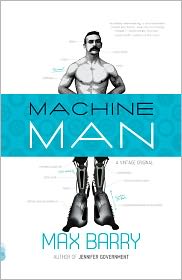Machine Man
by Max Barry
I have been a fan of Australian humorist Max Barry since his very first novel. For whatever reason, we’re on the same wave-length. But I have no illusions that this novel will find universal appeal. For one thing, the humor is dark, satirical, and squirm-inducing, and it made me uncomfortable even as I laughed.
The novel opens in the midst of a crisis; Charlie Neumann can’t find his phone. “I didn’t know how warm it would be today. It might rain, it might be humid, I had no idea… I would have to choose clothes without information on the environmental conditions. It was insane.” This loss has really thrown him off his game. Somehow the research scientist pulls it together and gets himself to the lab at Better Technologies. Unfortunately, spotting the errant phone at exactly the wrong moment spells disaster. The distraction is enough for Charlie to get his leg caught in an industrial clamp. The leg is crushed, and he wakes up an amputee from the thigh down.
Even the most traumatic events can have a silver lining, for it is at the hospital that he meets Lola Shanks, prosthetist and future love interest. Lola gets Charlie outfitted with a top-of-the-line prosthetic leg, and helps him learn to walk again. Still, the engineer in Charlie can’t believe that this is as good as it gets. Once back at the lab, he starts tinkering. He can build a better leg—and then one better still. Soon, the new leg is so superior in all ways that Charlie realizes that there’s no reason to keep an inferior “meat” leg. A second “accident” occurs.
While Charlie is back in the hospital being ordered psyche evaluations, his employer is beginning to realize that Dr. Neumann is on to something, something potentially profitable. From there, the novel moves in a generally predictable direction, though with plenty of surprises along the way. Barry is not going for subtlety in his story-telling. The reengineered scientist is “Neumann,” the prosthetist is “Shanks,” and a corporate fixer who plays a prominent role is named “Cautery.” No, it’s not about subtlety. Barry takes his satire to extremes, and the novel that I found myself thinking of as I read it—the only book with a tone that reminded me of this one—was Geek Love by Katherine Dunn. I don’t believe that Machine Man is that classic’s equal, but like the earlier book, there is true perversion in the very premise of the novel.
In addition to the humor, one of the reasons I enjoy Max Barry’s work so much is the exploration of ideas. Lola asks, “Where does this end for you, Charlie? New legs. New arms. Just out of curiosity. When do you say, okay, now I’m happy?” And Charlie finds it an odd question because, “you didn’t stop improving things. Reaching a point where everything was as good as good as it could be, that would be terrible. You might as well die.”
Or later, one of Charlie’s enhanced lab assistants asks, “Do you remember when I asked you about ethics? You wanted to suppress your guilt and I said maybe we shouldn’t and you said there was no such thing as shouldn’t. Actually, you didn’t even understand the question. Well, I get that now. I totally get it. Because sometimes you feel a kind of biological revulsion against an idea, but it’s only because you’re not used to it, right? It’s just a matter of baselines… I mean, it’s not like there’s any fundamental integrity of emotions, am I right? Everything’s chemicals when you get down to it.”
Do these questions give you a chill, or is it just me? Because, the reality is that in a delightfully amusing way, Max Barry is posing questions that some scientist out there has asked—or soon will be.


I read this when he originally wrote it, as a page-a-day serial novel that was sent to my e-mail inbox daily. I thoroughly enjoyed it, even though it was, as you say, squirm-inducing at times. I guess I'm going to have to get this in its new book form because I believe he did say it was going to be refined from the raw digital original.
ReplyDeleteHey SL,
ReplyDeleteYeah, this version is significantly different and more refined. It's really fascinating to look at it and compare the two.